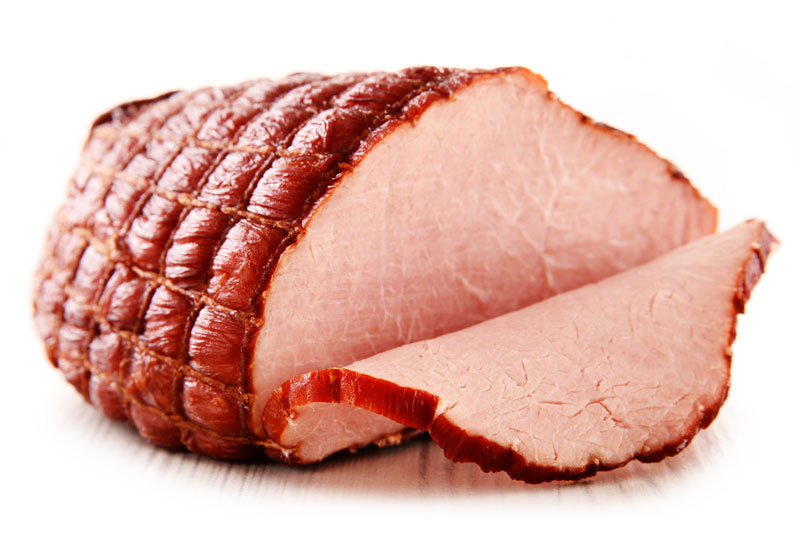If you have a flock of chickens at home, you might be wondering about their diet and what you can safely feed them. One common question I hear is, “Can chickens eat ham?” It’s a valid question, especially if you have some leftover from a meal.
Chickens can eat ham, but it is crucial to do so in moderation. Ham is high in sodium and fat, which are not ideal for chickens’ diets. What you should keep in mind is that while chickens can munch on ham, it should not be a primary part of their diet.
We’re excited to tackle this topic together! We will discuss how much ham is safe for chickens, the best ways to feed it to them, the benefits and risks of feeding ham, some substitutes, and answer some frequently asked questions. So, let’s get right into it.
- Can Chickens Eat Ham?
- How Much Ham Can Chickens Eat?
- Best Way to Feed Ham to Chickens
- Benefits of Feeding Ham to Chickens
- Risks of Feeding Ham to Chickens
- Substitutes for Ham in Chicken Diet
- Frequently Asked Questions
Let’s explore this topic together!
Can Chickens Eat Ham?

Chickens are omnivores and enjoy a variety of foods. They are known to eat grains, insects, fruits, and vegetables. Ham is also something they might find appealing given its flavor and smell. So, can chickens eat ham? Yes, they can. But there are a few points we should keep in mind.
Chickens have very different dietary needs compared to humans. While we can enjoy salty and fatty foods like ham, chickens should stick to a diet that is well-balanced and nutritious. Ham is not toxic to chickens; however, it contains high levels of sodium and preservatives, which can be harmful to them in large amounts.
It is essential to realize that chickens are sensitive to dietary changes. Their digestive systems are not as robust as ours, and they thrive on a stable diet. Feeding them ham occasionally, as a treat, is okay, but it should never constitute a large portion of their meals.
In the wild, chickens forage for their food. They naturally gravitate toward plants, grains, and small creatures. While ham may be an exciting treat for them, we should be cautious and not make it a staple item in their diet. If we decide to include ham as a treat, we must monitor how they react and how much they consume.
How Much Ham Can Chickens Eat?
When it comes to feeding ham to our chickens, moderation is the key. A small piece of ham now and then can be acceptable. Experts recommend that treats, including ham, should only make up about 10 percent of a chicken’s overall diet. The remaining 90 percent should consist of their regular chicken feed, which provides the necessary nutrients they need.
Let’s say we have some leftover ham from a family dinner. Cutting a small portion of that ham into tiny, manageable pieces can serve as a tasty treat. We should always remember that what seems like a tiny amount to us could be too much for our chickens. A few small bites is sufficient, and if they enjoy it, we can consider giving it to them occasionally.
While it might be tempting to give our chickens more ham because they seem to enjoy it, overfeeding them can lead to health issues. High sodium levels can create problems, such as dehydration or kidney issues in chickens. Consequently, it’s vital to keep portions small. If you have any worries about how much ham to give, it’s best to err on the side of caution and stick to a very minimal amount.
Also, we must consider the type of ham. Deli ham, or processed ham, often contains preservatives that might not be good for our chickens. Instead, if we choose to provide ham, opting for well-cooked, plain ham without a lot of added ingredients can be a better choice. This way, we can ensure that we provide our chickens with a safe treat.
Ultimately, creating a healthy balance in their diet is what matters. Let’s focus on providing our chickens with safe foods that contribute to their overall health. Treats should be just that—treats, so our chickens can remain happy and healthy.
Best Way to Feed Ham to Chickens
Feeding ham to chickens might sound easy, but there are specific methods we can use to ensure our approach is safe and enjoyable. To start, always choose fresh, cooked ham that does not contain any added sugars or spices. As mentioned before, deli ham and processed varieties often include preservatives, which are not suitable for our birds.
The first step in preparing ham for our chickens is to cut it into small, bite-sized pieces. Avoid giving them large chunks that they might struggle to eat. If the pieces are manageable, chickens are less likely to choke or have digestive issues.
We can introduce ham to our chickens in a couple of ways. If our chickens are used to treats, simply scattering small pieces around their coop can encourage foraging behavior. This mimics their natural habits and adds some excitement to their day. They will be happy to search for their tasty little treat!
Alternatively, if we want to ensure they’re all getting a taste, we can hand-feed them small pieces. This allows us to monitor their reactions and gauge how they like it. As we do this, we should observe them for any signs of discomfort or unusual behavior.
Once we’ve fed them ham, it is wise to observe how they respond. If they seem to enjoy it and don’t show any negative reactions, we can feel good about adding it to their treat rotation. Remember to keep it infrequent. A couple of times a month can be a guideline, but we should adjust as needed based on our chickens’ health and reactions.
In summary, feeding ham to chickens can be an enjoyable experience for our feathered friends when done correctly. Cooking well, cutting appropriately, and monitoring reactions all contribute to a fun and safe treat time.
Benefits of Feeding Ham to Chickens
Hydration
One benefit that can come from feeding ham to chickens is hydration. Depending on how it is cooked, ham can contain some water content, providing our chickens with additional moisture. While it shouldn’t be their primary source of hydration, it can serve as a minor boost. We all know how essential hydration is for any living creature, and chickens are no exception.
While our chickens should have access to fresh, clean water at all times, offering some moist foods can contribute to their overall hydration, particularly during drier months or hot weather. A splash of variety in their diet can keep them happy and healthy.
Fiber
Another benefit of feeding ham is that it can provide some fiber, even though fibrous content in ham is minimal compared to other foods. Fiber is an essential component of chickens’ diets because it aids digestion. Just like us, chickens need fibrous foods to keep their digestive systems running smoothly. However, it is crucial to prioritize more fibrous foods, like vegetables, grassy plants, and grains, in their diets for more significant benefits.
So, while ham does not fulfill the fiber requirements, adding it as an occasional treat can contribute to the overall fiber intake. We should remember to maintain a balanced diet for our chickens, focusing on those fibrous sources as their mainstay.
Vitamins and Minerals
Ham can provide some vitamins and minerals that our chickens may benefit from, such as B vitamins, zinc, and iron. These nutrients can play a role in overall health, helping with energy production and maintaining healthy skin and feathers. However, our main priority should still be to provide a nutrient-dense feed that meets all their dietary needs.
Incorporating ham occasionally can be a way to introduce variety and keep them engaged with their food. While we acknowledge the added nutrients, we are not relying solely on ham to nourish our birds. It should always be viewed as a supplementary treat instead of the primary source of nutrition.
Mental Stimulation
Offering our chickens ham can also serve as mental stimulation. Chickens are intelligent creatures that enjoy challenges, and foraging for food keeps their minds sharp. When we sprinkle some ham pieces in their area, they become engaged and curious. They might scratch the ground and search for their tasty rewards, which keeps them entertained and active.
Mental stimulation is crucial for chickens because it can prevent boredom, which can lead to undesirable behaviors such as feather pecking or stress. Keeping them engaged helps create a positive and lively environment for our chickens. When they’re happy, they usually lay better eggs, too!
Nutritional Breakdown of Ham
We should look at the nutritional breakdown when considering ham as a treat for our chickens. A typical serving of ham is rich in protein, which helps maintain muscle mass and support growth in healthy chickens. Ham contains beneficial nutrients like zinc and iron, as we mentioned.
However, the nutritional value of ham may vary depending on the type and preparation. Processed ham will often have more sodium, which is why it’s essential to choose high-quality ham if we opt to share it with our chickens.
While it’s great to understand the nutrients present in ham, we must prioritize a varied diet that includes the right balance of proteins, vitamins, and minerals from other food sources. Ham can occasionally be a fun treat, but it’s important to remember the bigger picture.
Dangers of Feeding Ham to Chickens
As with any food, there are significant risks to consider when feeding ham to our chickens. The most concerning factor is the high sodium content often found in ham. Sodium is not healthy for chickens, and consuming too much can lead to dehydration and kidney issues.
Over time, regular consumption of high-sodium foods can result in long-term health problems for our birds. It is vital to keep portions small and infrequent.
Another risk associated with ham is the potential for fatty content. Chickens thrive on a diet low in fat, and feeding them too many fatty foods can lead to obesity and other health complications. It may also contribute to sluggishness in their behavior and reduce egg production.
Feeding our chickens ham also poses the risk of spoiled food. Ham that is too old or has not been stored properly can create issues such as food poisoning. When introducing ham or any other leftover to our flock, it is essential to ensure it is fresh and safe for their consumption.
In summary, while we can include ham in our flock’s diet every once in a while, we must be cautious about quantity and frequency. Understanding the risks enables us to make informed decisions, ensuring the safety and health of our precious chickens.
Substitutes for Ham in Chicken Diet
If we are unsure about including ham in our chickens’ diet, we can always opt for healthier substitutes. Many excellent treats can provide our chickens with the diverse nutrition they need while keeping them happy and healthy.
Fruits and vegetables are great options. Chickens enjoy treats such as watermelon, berries, and leafy greens. These items are typically low in sodium and high in essential vitamins and minerals, making them beneficial for our chickens.
Grains can also serve as wonderful treat alternatives. Things like oats or barley can add variety to their meals and help satisfy their foraging instincts. Chickens often love to peck at grains.
Protein sources are equally important for our chickens. Scraps of cooked eggs or mealworms can offer valuable proteins that are healthier compared to ham.
Substituting ham with fresh, nutrient-dense foods can maintain a well-balanced diet for our chickens while providing them with safe and enjoyable treats.
Frequently Asked Questions
Can chickens eat any kind of ham?
Chickens can eat plain, well-cooked ham, but processed or deli-style ham should be avoided due to the added preservatives and sodium.
How often can I give ham to my chickens?
Ham should only be given occasionally and in small amounts. It should make up no more than 10 percent of their overall diet.
Can chickens eat ham bones?
No, we should not give chickens ham bones as they can present a choking hazard and may splinter, leading to digestive issues.
What treats are safe for chickens?
Safe treats for chickens include fruits, vegetables, whole grains, and protein-rich foods like mealworms or cooked eggs.
Can feeding ham impact egg production?
Feeding ham in moderation will not significantly affect egg production, but if overfed, it can result in health issues that might affect egg-laying.
Final Thoughts
In conclusion, we can safely say that chickens can eat ham, but moderation is key. Ham can be a delightful treat for our chickens, offering some hydration, protein, and mental stimulation. However, it should always remain a supplement to a well-balanced diet rich in essential nutrients.
As responsible chicken owners, we must prioritize their health by making informed choices about what we feed them. Providing a diverse variety of safe foods ensures that we take good care of our flock while keeping them happy and healthy. If you’re looking for more tasty treats for your chickens, you might want to explore whether they can eat grapes or other fruits.






